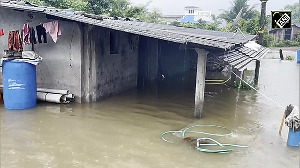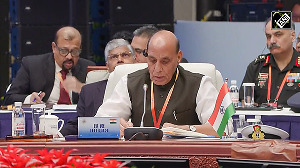Royce's appointment as chairman of the terrorism, non-proliferation and trade sub-committee was announced by Congresswoman Ileana Ros-Lehtinen, who is the incoming chairperson of the powerful house foreign relations committee.
Soon thereafter, Royce, who is the current co-chair of Congressional India Caucus, expressed his grave concern over the safety of the Pakistani nuclear arsenal, while outlining his agenda. "The subcommittee faces three daunting challenges -- the far-reaching spread of Islamist terrorism and ideology; the proliferation of nuclear weapons and material; and a stalled trade agenda hampering US economic growth. The sub-committee will delve into all of these issues, seeking to make Americans more prosperous and safe," Royce said in a statement.
"Terrorism and proliferation should be linked. The threat of a terrorist using weapons of mass destruction is deadly serious. While today's terrorist attacks are mainly suicide bombings, terrorist groups are looking to get WMD," he wrote in a blog on his website after he was appointed the chairman of the subcommittee.
"We desperately need new strategies to combat this spreading technology. I'm gravely worried about the security of Pakistan's nuclear arsenal," he wrote.
In Washington, "We've backtracked since the 9/11 commission identified Islamist terrorism as the threat we face. Many don't even want to touch this, referring to the generic 'violent extremism'. Better know thy enemy," he said.
On the trade issue, he described as "very troubling" China's "abuse" of American investors and "stealing technology by hook or by crook."
"China's rule of law is very weak. Beijing appears committed to winning economic battles by any means necessary, jeopardising our economic well-being. But at least American executives are losing their rose-coloured glasses, finally speaking out. Congress is listening," Royce said.
Upon making the announcement of his appointment, Ileana Ros-Lehtinen said Royce is one of the most respected members on the committee and is someone the American people can count on in this capacity to help prevent extremists and other outlaws from threatening the US.
"He has been a critical partner in holding North Korea accountable for its nuclear and missile activities, its aggressive posture against US allies and its money laundering activities that directly undermine US security interests," she said.
Representing the 40th District of California, Royce has been instrumental in strengthening relations between the US and India. In the 107th and the current 111th session of Congress, Royce chaired the Congressional Caucus on India and Indian Americans.
Starting with only eight members, Royce helped build the Caucus to become one of the largest in the House, with over 180 members.
Royce was designated by Speaker of the House Dennis Hastert to be an official member of the then US president Bill Clinton's historic delegation to India in 2000. He has travelled several more times to India.
Following the January 2001 earthquake in Gujarat, Royce led a Congressional delegation to the ravaged area to help. As sister states, Gujarat and California both lie in earthquake prone areas. Royce worked to help the two to share information on early warning systems.
In 2001, Royce led the effort to lift sanctions against India, co-authoring a legislation to remove all curbs and economic restrictions imposed on India under the Clinton administration. With this groundwork laid, the administration moved to remove the sanctions on India in 2001.
One of US Congress's experts on India, Royce managed a legislation on the House floor in July 2006 to pass the historic US-India Civil Nuclear Cooperation Agreement, beating back several "poison pill" amendments.
In November 2008, he actively supported a resolution in condemning the horrific terrorist attacks in Mumbai.
Commenting on the attacks on the House floor, Royce had stated, "What is clear is that Pakistan and South Asia are at a crossroads. Pakistanis have to make the fundamental decision to turn their backs on the culture of jihad. For if they don't, the future of their country, the region and security in the world will be in peril."





